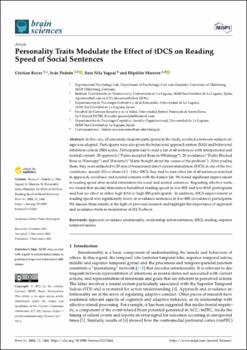Personality traits modulate the effect of tDCS on reading speed of social sentences
Date
2021Abstract
In this case, 62 university students participated in the study, in which a between-subjects design was adopted. Participants were also given the behavioral approach system (BAS) and behavioral
inhibition system (BIS) scales. Participants had to read a list of 60 sentences with interpersonal and
neutral content: 20 approach (“Pedro accepted Rosa in Whatsapp”), 20 avoidance (“Pedro Blocked
Rosa in Whatsapp”) and 20 neutral (“Marta thought about the causes of the problem”). After reading
them, they were subjected to 20 min of transcranial direct current stimulation (tDCS) in one of the two
conditions: anodal (31) or sham (31). After tDCS, they had to read other list of 60 sentences matched
in approach, avoidance and neutral contents with the former list. We found significant improvement
in reading speed after anodal stimulation for social and neutral sentences. Regarding affective traits,
we found that anodal stimulation benefitted reading speed in low-BIS and low-BAS participants
and had no effect in either high BAS or high BIS participants. In addition, tDCS improvement in
reading speed was significantly lower in avoidance sentences in low-BIS (avoidance) participants.
We discuss these results at the light of previous research and highlight the importance of approach
and avoidance traits as moderators of tDCS effects.





